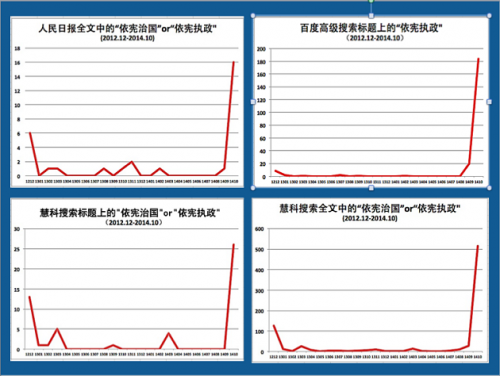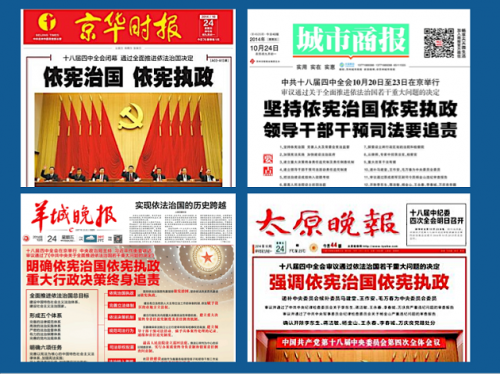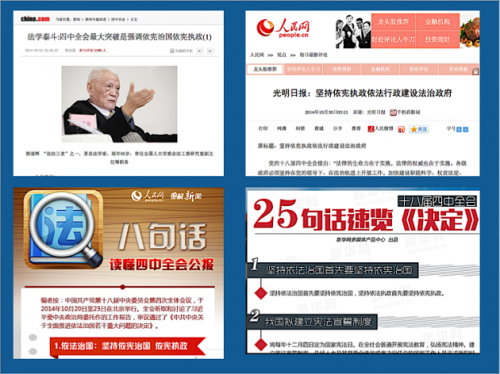The recent 4th Plenum of the 18th Central Committee of the Chinese Communist Party introduced a policy document with the long-winded title, Decision on Major Issues Concerning the Comprehensive Promotion of Rule of the Nation in Accord with the Law (关於全面推进依法治国若干问题的决定). One key takeaway of the “Decision” is the return of a pair of phrases that for some period of time had disappeared from official media coverage in China — “ruling the nation in accord with the constitution” (依宪治国) and “governing in accord with the constitution” (依宪执政).
For some background on these terms, readers can turn to two pieces I posted back in September, “The Missing Speech” and “Xi’s Missing Terms Emerge Again.”

On December 4, 2012, Xi Jinping made a speech in Beijing to commemorate the 30th anniversary of the promulgation and implementation of China’s constitution. This speech attracted a great deal of attention both inside and outside China. In the speech, Xi Jinping said: “Rule of the nation by law means, first and foremost, ruling the nation in accord with the constitution; the crux in governing by laws is to govern in accord with the constitution” (依法治国首先是依宪治国,依法执政关键是依宪执政).
For Xi Jinping to use the words “first and foremost” and “crux” in these remarks represented a marked departure from the language of his predecessors, Jiang Zemin and Hu Jintao.
But in 2013, in the midst of the “Seven Don’t Speaks” (七不讲) policy and a wave of anti-constitutionalism rhetoric, this pair of Xi Jinping terms disappeared from official discourse altogether. They even became, we could say, sensitive terms.
As I wrote in “The Missing Speech,” when the Central Propaganda Department published a book last summer called A Primer of Important Speeches by General Secretary Xi Jinping, Xi Jinping’s December 2012 speech on constitutionalism was unaccountably left out of the collection.
Finally, on September 5, 2013, in a speech to commemorate the 60th anniversary of the establishment of the National People’s Congress, President Xi again used his two-part phrase: “Rule of the nation by law means, first and foremost, ruling the nation in accord with the constitution,” he said. “The crux in governing by laws is to govern in accord with the constitution.”
As Xi’s speech was reported in the official People’s Daily, the six-month disappearance of this political phrase was finally ended. However, the phrase went silent again immediately after the People’s Daily report, resurfacing only after the “communique” (公报) for the 4th Plenum was released in late October.
Searching for the pair of terms between December 2012 and October 2014 in three separate databases — the People’s Daily (PD coverage alone, full text); WiseNews (100+ mainland papers, full text and headline search); Baidu.com (covering all mainland news sites) — I arrived at the following results, which show a clear pattern across all three databases. The bottom two graphs are both for WiseNews, the headline search on the left and the full text search on the right.

In December 2012, soon after Xi Jinping came to power, the terms “ruling the nation in accord with the constitution” and “governing in accord with the constitution” appeared in six separate articles in the People’s Daily. In October 2014, the terms appeared in 16 articles in the People’s Daily, all but one of these after October 20, telling us they were closely related to the 4th Plenum.
The WiseNews database tells us that in December 2012 there were a total of 126 articles in mainland Chinese newspapers mentioning the two terms somewhere in the full text. After a period of 21 months with no use of the terms whatsoever, they appear in 514 articles in October this year.
This roller coaster ride of official discourse is not without its reasons. Some friends of mine who observe political events in China will say that the Chinese Communist Party doesn’t match its words with deeds and so there’s no sense in paying attention to the way it deploys language. But I believe we can, if we observe China’s political discourse carefully, glimpse the drift, collision and upheaval of the tectonic plates of Chinese politics.
The discourse of the Chinese Communist Party can be divided into five categories I label as follows: “cosmetic language” (脂粉语), “body hair language” (皮毛语), “banner language” (旗帜语), “gate of life language” (命门语) and “pointing language” (要穴语).
The first two types, including the “cosmetic language” the Party uses to sing its own praises (“representing the interests of the masses,” etcetera) and the “body hair language” of rigid but mostly meaningless formalism (like talk of “socialist core values”), can be disregarded in terms of their significance in reading political affairs in China.
By contrast, “banner language” — terms like the “Three Represents” (三个代表) of Jiang Zemin — do merit our attention as markers of the legacies and perhaps agendas of top leaders. (Note that Xi Jinping’s “banner term” is still not clear, and the “Chinese dream” doesn’t quite fit the bill.)
Examples of “gate of life language” would include fundamental principles that the Party cannot and will not dispense with. Take, for example, the “Four Basic Principles” (四项基本原则), of which the core principle is the leadership of the CCP.
Finally, there are terms like “political system reforms” (政治体制改革) or “ruling the nation in accord with the constitution” (依宪治国) which can be exceptionally sensitive directional pointers about where the Party intends to go, or how it intends to change. Behind the ebb and flow of this “pointing language” we can see the fierce tug-of-war of Chinese politics.
High and mighty advocacy of “constitutional rule” (依宪) certainly does not equal true love or acceptance of the Constitution or constitutionalism, but the erasure and denial of “constitutional rule” as reflected in the official discourse does offer conclusive proof that forces within the Chinese Communist Party are acting out their hatred of, and opposition to, this idea.
At the same time, both inside and outside the Chinese Communist Party, there are still forces in pursuit of constitutionalism and democracy. Of late, these forces are exceptionally weak — but they hang on still, holding still and making no sound.
When Xi Jinping first spoke of “ruling the nation in accord with the constitution”, the well-regarded journal Yanhuang Chunqiu (炎黄春秋), Southern Weekly and others grew somewhat bolder in their support. This was followed by a vicious wave of anti-constitutionalism that accounted for the dramatic disappearance of both of Xi Jinping’s terms, “ruling the nation in accord with the constitution” (依宪治国) and “governing in accord with the constitution” (依宪执政).
The anti-constitutionalism wave did not by any means root out support for the idea of constitutionalism, and as soon as the curtain closed on the 4th Plenum a number of media rushed to do special reports on “ruling the nation in accord with the constitution.” The following are several examples.

I observed recently that a number of websites, particularly official websites, also did obvious coverage of Xi Jinping’s pair of constitution-related terms. People’s Daily Online and Xinhua Online both did summaries of “important sentences” summing up the 4th Plenum “Decision,” and in both cases the term “ruling the nation in accord with the constitution” topped the list.

We must note, however, that the above newspapers and websites represent just one corner of China’s media. And these treatments we see fall somewhere on a spectrum between “directed action” (规定动作) – meaning they were demanded by certain Party interests – and “self action” (自选动作), meaning they were a matter of conscientious choice.
For the time being, we can say that “ruling the nation in accord with the constitution” and “governing in accord with the constitution” have crawled out from the valley of the past almost two years. However, they have yet to become widely accepted “hot words” (热词) within the broader discourse sphere. Their longer-term survival and development is far from certain.
Looking at coverage in the official People’s Daily last month, we can see that neither constitution-related term appeared in a headline in the newspaper. At the same time, 122 articles in the People’s Daily last month used the term “ruling the nation in accord with the law” (依法治国), and in 36 of these instances this term appeared in the headline.
Looking at the broader universe of print media coverage in the WiseNews database, we find that the constitution-related terms appeared in just 26 articles, while the latter term, “ruling the nation in accord with the law,” appeared 591 times. And Baidu shows a similar gap, with 694 online articles using the constitution-related terms and 110,000 using “ruling the nation in accord with the law.”
It seems, therefore, that the real “hot term” during the 4th Plenum was “ruling the nation in accord with the law” – leaving the constitution out in the cold.
“Ruling the nation in accord with the law” was the main topic of the recent 4th Plenum. As the text of the “Decision” said:
Rule of the nation by law means, first and foremost, steadfastly ruling the nation in accord with the constitution; the crux in governing by laws is to steadfastly govern in accord with the constitution” (坚持依法治国首先要坚持依宪治国,坚持依法执政首先要坚持依宪执政) – the idea being that abiding by the constitution is the crux of “ruling the nation in accord with the law.
But the very idea of the centrality of the constitution makes many within the Party nervous. And just as the communique from the 4th Plenum was released, an article appeared online with the headline, “‘Governing in Accord with the Law’ Cannot be Confused with Western Constitutionalism” (依宪执政与西方「宪政」不容混淆). The article set the rather subdued tone for understanding the notion of “governing in accord with the law.” A search on Baidu shows that 106 websites ran this particular article, which was clearly propagated under direct instruction from propaganda authorities.
The byline of the article, Guo Ping (国平), is not in fact a person, but the official nom de plume of the Information Office of the State Council.




















